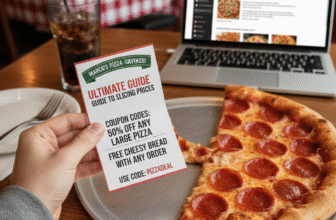
Living large on a budget: Mastering the art of couponing
Think “extreme couponing” is just for reality TV? Think again. While you might not need a warehouse to store your stockpile, strategic couponing can significantly impact your budget, freeing up funds for experiences, savings, or paying down debt. It’s not about deprivation; it’s about smart shopping. It’s about making your money work harder for you, allowing you to live a richer life without necessarily spending more. This guide will walk you through the essentials of couponing in the modern age, from finding the best deals to organizing your savings strategy.
Beyond the Sunday paper: Finding coupons in the digital age
While the Sunday newspaper is still a viable source of coupons, the digital landscape has revolutionized couponing. Here’s where to look:
- Manufacturer websites: Many brands offer printable coupons directly on their websites. Check the “promotions,” “offers,” or “coupons” section.
- Coupon websites: Dedicated coupon websites aggregate deals from various sources. These sites often allow you to search by product, brand, or store.
- Store websites and apps: Most major retailers have their own websites and apps that feature digital coupons. These can often be “clipped” directly to your loyalty card.
- Cash-back apps: These apps offer rebates on specific purchases. You typically scan your receipt after shopping, and the cashback is credited to your account.
- Browser extensions: Browser extensions can automatically find and apply coupon codes when you’re shopping online. This takes the legwork out of searching for deals.
- Social media: Follow your favorite brands and retailers on social media. They often announce exclusive deals and coupon codes to their followers.
- Email newsletters: Sign up for email newsletters from brands and stores. You’ll often receive exclusive coupons and early access to sales.
Decoding the coupon lingo: Understanding the fine print
Coupons come with their own set of terms and conditions. Understanding these is crucial to maximizing your savings:
- Expiration dates: Pay close attention to expiration dates. Using an expired coupon is generally not possible.

- Size restrictions: Some coupons are only valid on specific product sizes or varieties. Make sure you’re purchasing the correct item.
- Quantity limits: Some coupons limit the number of items you can purchase at the discounted price.
- Store-specific coupons: These coupons can only be used at the designated store.
- Manufacturer coupons: These coupons can generally be used at any store that accepts them.
- Stacking: Some stores allow you to “stack” coupons, meaning you can use both a store coupon and a manufacturer coupon on the same item. Check your store’s policy.
- “One per purchase” vs. “One per transaction”: “One per purchase” means you can use one coupon for each qualifying item you buy. “One per transaction” means you can only use one coupon for the entire transaction, regardless of how many qualifying items you purchase.
Organizing your coupons: Efficiency is key
A disorganized coupon collection is a missed opportunity. A good system will save you time and ensure you don’t miss out on deals:
- Physical coupons: Use a binder, accordion file, or coupon organizer to sort your coupons by category (e.g., dairy, cleaning supplies, personal care).
- Digital coupons: Utilize the “clip” or “save” features on store apps and websites. Create folders in your email inbox for coupon-related emails.
- Expiration date tracking: Regularly review your coupons and discard any that have expired. Some organizers have pockets specifically for soon-to-expire coupons.
- Shopping list integration: Before you head to the store, review your coupons and create a shopping list based on the deals you have.
Strategic shopping: Planning your trips
Maximizing your coupon savings requires more than just clipping coupons. It involves strategic planning:
- Meal planning: Plan your meals around the coupons you have and the sales that are running. This minimizes food waste and maximizes savings.
- Compare prices: Don’t assume that a coupon automatically makes an item the cheapest option. Compare prices between brands and stores, even with coupons.
- Shop sales cycles: Stores often have predictable sales cycles. Learn when your favorite items typically go on sale and stock up then, using coupons for extra savings.
- Utilize loyalty programs: Combine coupons with store loyalty programs for even greater discounts. Many stores offer personalized coupons and rewards based on your shopping history.
- Don’t buy what you don’t need: Just because you have a coupon doesn’t mean you need to buy the item. Avoid impulse purchases driven solely by a discount.
- Price matching: Some, stores price match, it will help to get even lower prices.
Beyond groceries: Couponing for other expenses
Couponing isn’t limited to groceries. You can find coupons for a wide range of products and services:
- Clothing and apparel: Retailers frequently offer coupons and discounts, especially during seasonal sales.
- Restaurants: Look for coupons in local newspapers, coupon books, and online. Many restaurants also offer deals through their apps and email lists.
- Entertainment: Check for discounts on movie tickets, theme park admissions, and other entertainment venues.
- Travel: Use coupon codes and discount websites to save on flights, hotels, and rental cars.
- Home improvement: Hardware stores often offer coupons on tools, paint, and other supplies.
- Services: You may also apply coupon codes for different services, like car wash or dry cleaning.
Ethical couponing: Playing fair
It’s important to use coupons ethically and responsibly:
- Don’t use counterfeit coupons: Counterfeit coupons are illegal and can result in serious consequences.
- Follow the rules: Adhere to the terms and conditions printed on the coupon.
- Don’t clear shelves: Leave some items for other shoppers, even if you have multiple coupons.
- Be respectful of store staff: Cashiers are often busy, so be patient and organized when using coupons.
The long-term benefits: Building a savings mindset
Couponing is more than just saving a few dollars here and there. It’s about cultivating a savings mindset. By becoming a more conscious and strategic shopper, you’ll develop habits that can benefit your finances in the long run. You’ll learn to prioritize needs over wants, to seek out value, and to make your money work harder for you. This mindset can extend beyond couponing to other areas of your finances, helping you achieve your financial goals, whether it’s building an emergency fund, saving for a down payment on a house, or investing for retirement. The discipline and awareness you gain from couponing can be surprisingly powerful tools for building a more secure financial future. Couponing might seem a small thing, however the cumulative effect of saving on your expenses will help to rich the financial freedom.
Advanced coupon strategies
Once you are accustomed with the basics, time to use some extra strategies:
- Double and triple coupon days: Some stores occasionally offer days where they double or even triple the value of manufacturer coupons.
- Overages: It is some situation when the value of coupon exceeds the price of the product.
- Rain checks: It is possible to use them when the coupon is no longer valid, but the product was at the sale price.







